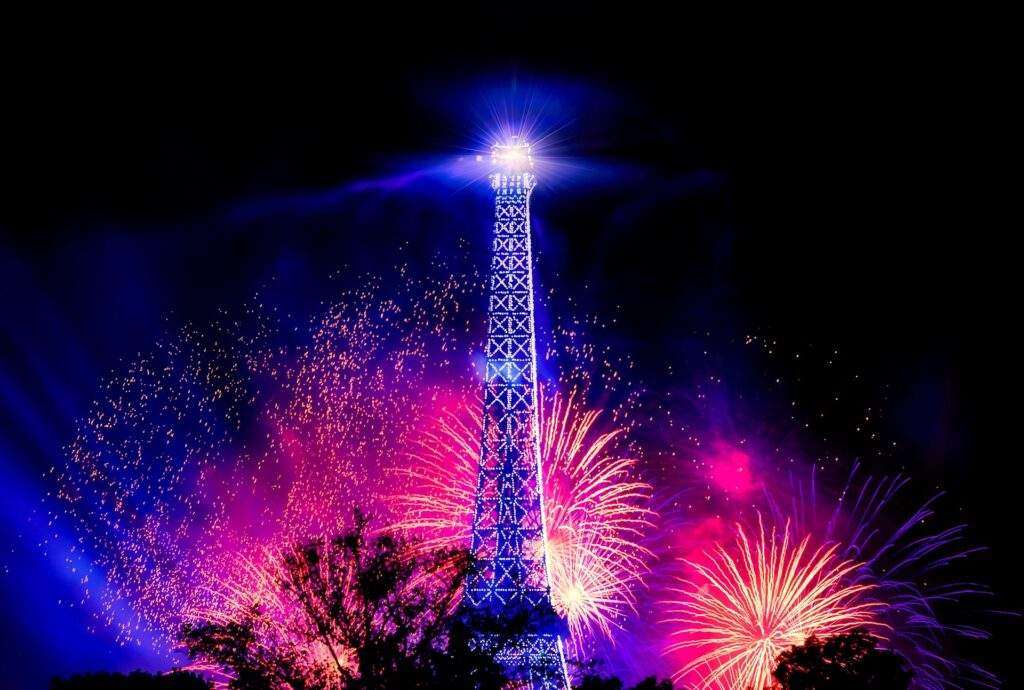July 14th is a national holiday in France. In fact, it is the national holiday in France. In Paris, Bastille Day is marked by a military parade down the Champs-Élysées, an aircraft flyover of the city, and a spectacular fireworks display off of the Eiffel Tower. It is certainly a day of celebration, but don’t make the mistake of wishing a French person, “Happy Bastille Day!” They will have no idea what you’re talking about. Say what? I think it’s time for What’s in a Name? Part IV.
Bastille Day or Not, That is the Question
On July 14th, 1789, revolutionaries stormed the Bastille prison in Paris. This event marks the start of the French Revolution and a dramatic turning point in the history of France. It is also the event that is commemorated as Bastille Day in English speaking countries. But what about in France? Don’t the French want to celebrate this momentous occasion as well? The answer to that is a little more complicated.
The current annual celebration of July 14th began in the 19th century. As France approached the centennial of the French Revolution, the government of the Third Republic decided to create a national holiday. The only question was, on what day? Several options were put forward, including August 5th, which marked the end of the feudal system, and May 5th, which marked the assembly of the Estates-General. However, the government ultimately chose July 14th. But this date was not without controversy. Many people didn’t want France’s national holiday to celebrate a day of bloodshed and the technically illegal actions of those who had stormed the Bastille. So an alternative solution was found.
La Fête de la Fédération
On July 14th, 1790, a grand celebration was held on the Champ de Mars. It was a celebration in honour of the one year anniversary of the revolution, and it was meant to showcase the unity of France one year later. The event was attended by King Louis XVI and Marie Antoinette, as well as all of the deputies of the newly formed National Constituent Assembly. The Marquis de Lafayette led everyone in a solemn oath to the new French Constitution, and Louis XVI formerly accepted his new title as King of the French. Not King of France. Thousands of citizens attended the event from all over France, and the party lasted until July 18th. More importantly, the Fête de la Fédération was entirely peaceful. So much so, that many people believed that the political turmoil of the revolution was now safely in the past.
Of course, history would soon prove that sentiment to be very much incorrect. But for a few glorious days in 1790, the future looked bright indeed. The King had publicly accepted his role as the head of a constitutional monarchy. The three estates were finally unified. And the people had a brand new constitution that established that the authority of the state was through the consent of its people. France had popular sovereignty at last. It is easy to see why 100 years later, the French government would want to celebrate the Fête de la Fédération instead of the storming of the Bastille.
La Fête Nationale
Today, people in France refer to July 14th as La Fête Nationale or Le quatorze juillet. National Day or the day of July 14th. It is a day to commemorate the Fête de la Fédération and the unity of France. And even if the storming of the Bastille is the more widely known story, you will never hear a French person refer to this holiday as le jour de la Bastille. So this coming Thursday, I wish everyone a very bonne fête nationale and a joyeux 14 juillet. If you are in Paris, I highly recommend watching the fireworks display off of the Eiffel Tower on the evening of the 14th. Every year, it continues to be the most spectacular fireworks display I’ve ever seen.
Bonne Fête Nationale!
Laura Moore is a professional storyteller who loves history and the many stories that make Paris one of the most fascinating cities in the world. Join one of her signature tours to learn the story of a city.




